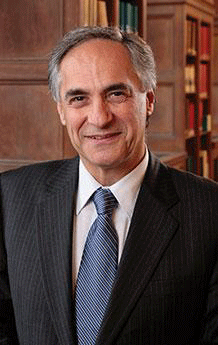University of Chicago President on Freedom of Expression

Zimmer speaks of free speech as a key component to higher education.
President of the University of Chicago Robert Zimmer came to Colgate to talk about the importance of free speech on college campuses. His lecture was sponsored by the Center for Freedom and Western Civilization and took place on Thursday, March 30.
President Brian Casey introduced Zimmer and highlighted their previous experience working together at Brown University, where Zimmer and Casey once served as Provost and Assistant Provost, respectively. According to Casey, they were able to effect change and worked well together.
Zimmer began by discussing recent events, including Charles Murray’s visit to Middlebury College and colleges uninviting speakers like Condoleezza Rice, Laura Bush and Henry Kissinger, among others. He contrasted this with his visits to China, where he claimed many universities are trying to increase the existence of different beliefs and avenues to challenge ideas in order to promote intellectual growth.
Zimmer then highlighted the University of Chicago’s mission of education, research and impact. He argued that all students deserve an enriching education, which necessarily includes intellectual freedom expressed through free speech.
“The impact of universities is through the impact of research of faculty and alumni and relies on freedom of expression,” Zimmer said.
Zimmer warned that if free expression were to be stifled, then it would harm the value of education. He summarized three important principles included in University of Chicago’s Statement on Principles of Free Expression. He argued that it is not the place of a university to shield individuals from differing opinions, but instead universities should be places where rigorous argumentation is exercised. Zimmer also highlighted that the Statement on Principles of Free Expression embraces protest so long as it does not limit the rights of others.
“A serious commitment to full inclusion for all our students is the most enriching education we can provide,” Zimmer said.
Zimmer argued that suppressing speech is a bad reaction to exclusive behaviors, which have historically limited participation by marginalized groups. By limiting discussion of another, he argued that you are opening an opportunity for others to do the same to you. He also argued that many hold a misguided view that protecting students from this discourse is the correct course of action. Zimmer believes that universities should encourage complete participation by all students, instead of helping them retreat and separate.
“Addressing these issues eventually means addressing the culture of the
institution,” Zimmer said.
Zimmer highlighted the importance of leadership, whether it be by a president, provost or dean, in shaping the culture of expression on a university or college campus.
“You need to think about how you use the voice that you have,” Zimmer said.
Sophomore William Shaw reflected on the importance of asking difficult questions and giving thoughtful answers.
“I was impressed by the fact that he rarely avoided the hard questions but instead took the time to explain why he maintained support for free speech and open discourse as the fundamental element without which intellectual
innovation cannot happen,” Shaw said.
Zimmer also discussed the idea of limitations to the concept of free speech. He commented on the need for things like non-harassment policies as a basis for operation.
When asked about not inviting speakers based on ethical and factual matters, Zimmer was firm in his dedication to free speech.
First-year Owen Piper offered his own opinion on the freedom of speech.
“I really enjoyed the lecture and thought that it brought up a lot of interesting points,” Piper said. “In theory, I think that free speech is an ideal aspect of any college campus and society in general. However, in practice I think that schools need to be careful when implementing this and draw a firm line between what is free speech and harassment, as some unpopular opinions could be misconstrued as harassment and vice versa.”
Junior Jenny Robinson believes that free speech in a university is a necessary part of intellectual and personal growth.
“What President Zimmer is proposing is not just about freedom of expression, but also about a level of academic respect for intellectuals. As an educational institution, it is crucial to have mature, respectful and open discourse to become exposed to various views, challenge [and] strengthen our beliefs and develop ourselves as intellectuals,” Robinson said.
Shaw commented on the importance of embracing free speech, especially when perspectives clash. In response, he encouraged taking direct action to facilitate
conversations about these differences.
“Something I hope everyone took away from it is that tolerating a speaker at a university does not imply the administration’s support but rather leaves it to the people in the universities themselves to take a personal stand on issues and engage with their fellow students,” Shaw said.
Interested in how Colgate will respond from an administrative standpoint, first-year Jack Reston articulated his hopes for the future.
“I thought the talk was timely and informative,” Reston said. “Thinking about how to address divisive topics from the perspective of both administration and student is perhaps the paramount issue on a college campus today. As such, I was glad that President Zimmer was able to shed light on the issue in such an intelligent and professional way. Hopefully, the Colgate administration can follow up on this performance and perhaps provide other perspectives on the issue of free speech as it relate[s] to the collegiate setting.”






